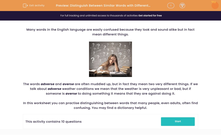Many words in the English language are easily confused because they look and sound alike but in fact mean different things.

The words adverse and averse are often muddled up, but in fact they mean two very different things. If we talk about adverse weather conditions, we mean that the weather is very unpleasant or bad, but if someone is averse to doing something, it means that they are against doing it.
In this activity, we will practise distinguishing between words that many people, even adults, often find confusing. You may find a dictionary helpful.








